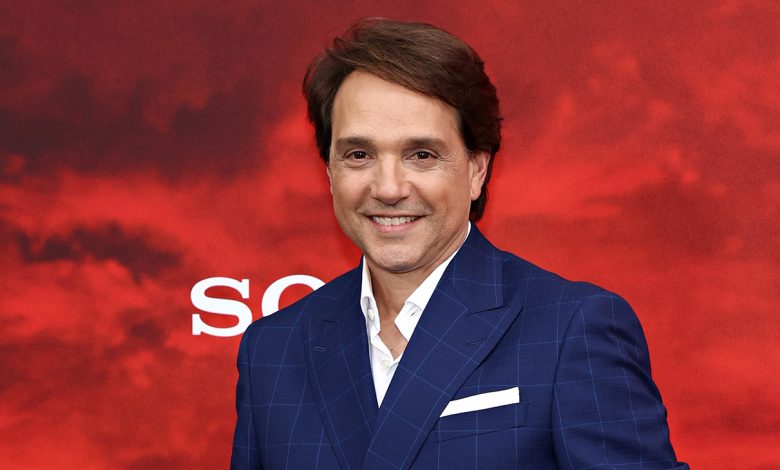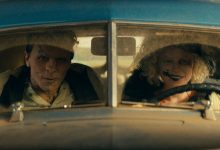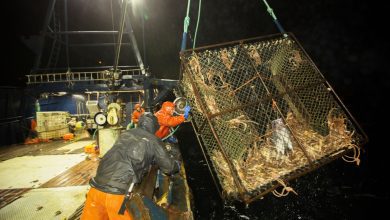Ralph Macchio Talks Cobra Kai Connections

48 hours after wrapping Cobra Kai in Atlanta, Ralph Macchio was right back where he started on the Montreal-based set of Karate Kid: Legends.
Macchio stepped foot onto Legends’ version of the Mr. Miyagi house that he and Pat Morita made famous four decades earlier in John G. Avildsen’s The Karate Kid (1984). The original house in Canoga Park was demolished after production concluded on 1986’s The Karate Kid Part II, before being rebuilt at Warner Bros. Ranch for 1989’s Part III. Cobra Kai then constructed an iteration of it that evolved across six seasons on its Atlanta-based set.
“It was the weirdest feeling. I literally was at somebody else’s house, but I kind of helped build the house,” Macchio tells The Hollywood Reporter in support of Karate Kid: Legends’ May 30 theatrical release.
In Jonathan Entwistle’s legacy sequel, Macchio’s Daniel LaRusso is paid a visit by Jackie Chan’s Mr. Han from 2010’s The Karate Kid, folding the former standalone reboot into the mothership franchise. The Legends creative team realized that Part II’s Miyagi family dojo scene could be expanded upon to link the Okinawa, Japan-based Miyagi family with the Han family in China. In 1625, Mr. Miyagi’s fisherman ancestor, Shimpo Miyagi, fell asleep at sea and woke up off the coast of China. That’s where the Han family took him in and taught him kung fu. Upon his return home, he established Miyagi-Do Karate, combining the two families’ unique martial arts and creating a lasting friendship that endured through Mr. Miyagi and Mr. Han. (The 2010 film’s brain trust used the same Part II scene inside the Miyagi family dojo as a jumping-off point for their China-set story.)
Macchio previously met Chan at the 2010 premiere of The Karate Kid, and while he was always a good sport in public, he admits that he was privately conflicted about Chan’s remake at first. But through the unlikely creative merger, Macchio couldn’t be happier with how it all unfolded, especially now that he’s shared action scenes with Chan in the name of training Mr. Han’s great-nephew, Li Fong (Ben Wang).
“I was territorial upon first hearing of [2010’s The Karate Kid]. I didn’t understand what they were going for, and I had walked in the shoes for so long. I just felt, ‘How are you going to do a retread of [1984’s The Karate Kid]?’” Macchio says, “But they made a movie that was well-crafted and highly successful. I always describe that movie as a lesson in how you can tell virtually the same story, but still make it a completely different movie.”
Karate Kid: Legends was originally announced in September 2022, and it immediately raised a number of questions as to how it would navigate the then-upcoming final season of Cobra Kai. It’s now known that Legends was always going to be set three years after the series finale of Cobra Kai, but two of its previous release dates — June 2024 and December 2024 — fell before the series’ February 2025 conclusion. (Both projects were delayed by the 2023 strikes.) As a result, Macchio became adamant that the film delay itself until after Cobra Kai‘s completion — in order to not confuse the Cobra Kai audience and hopefully attract them to the movie off the strength of the satisfying series finale and successful overall run.
“When [Karate Kid: Legends] was initially slated for a December 13, 2024 release, I was screaming constantly every day: ‘This movie has to come out after [Cobra Kai] finishes,’” Macchio shares. “And once marketing got together and realized that [the December ‘24 release] would not benefit either, they did the right thing [by delaying until May 2025]. Karate Kid: Legends is now coming at a time where I like to believe that Cobra Kai fans are thirsty for another chapter.”
As for the future of Daniel LaRusso, Macchio confirms that several Cobra Kai spinoffs are in development, and it’s just a matter of time before Netflix and creators Jon Hurwitz, Josh Heald and Hayden Schlossberg decide which direction(s) to go next.
“There are a few balls up in the air. I don’t know which one is going to land. I hope all of them do, or some of them do, or one of them does,” Macchio says. “The success of Karate Kid: Legends could propel all that stuff. It’s different, but the same. There’s a Miyagi-ism for you.”
Below, during a recent conversation with THR, Macchio also discusses the responsibility he feels to protect the Karate Kid franchise now that he’s one of the last remaining principals from 1983’s foundational film.
***
When Karate Kid: Legends first came along, you were still shooting Cobra Kai. So how was the movie’s timeline explained in relation to the show?
The first I heard about it, I said, “Okay, where does this land?” because the Cobra Kai guys — [showrunners] Jon Hurwitz, Josh Heald and Hayden Schlossberg — were not involved with the creation of Karate Kid: Legends. So I got the concept, and to me, it was just about figuring out the genuine, honest connective tissue going forward. For me, it’s always been about carrying the Miyagi-verse or the legacy forward.
Chronologically, [Karate Kid: Legends] was always set about three years after the events of Cobra Kai. Cobra Kai started in 2018, and so the kids on that show would be in their third year of college [during Karate Kid: Legends]. That was determined early on, and then it was about landing Daniel LaRusso in a way that feels like a natural evolution and progression when we see him three years later. That’s where my real focus was and how I would layer him into this fresh separate storyline. It’s like its own ecosystem in the grand universe.
At the end of Cobra Kai, he lands in a very positive way. He and Johnny Lawrence are the best versions of themselves going forward. In Karate Kid: Legends, we find him being far more Miyagi in his sensibilities and his grounded wisdom. In Cobra Kai, it was designed that the more knee-jerk and up-in-Johnny’s-face he was, the better it was to service Johnny Lawrence’s redemption. So I’d be like, “Okay, but when do we land in Miyagi-land?” That is where I thought LaRusso would end up with all his wisdom from his mentor, a very grounded mother, a good life, a good business and a good wife. And then we landed Daniel at that place.
So when we pick him up three years later, he’s in Miyagi’’s yard, and to him, that house is like a museum of his childhood. He takes off his gardening gloves after Jackie Chan’s Mr. Han comes into the dojo, and then he’s reminded of the [Miyagi-Han family] connection. The [flashback] piece of Karate Kid Part II talks about how [Miyagi-Do] karate came from China, and so we were off to the races. It made sense. It was then all about protecting LaRusso and that relationship that was born in 1984, which has now given birth to this whole franchise.

(L-R) Ralph Macchio, Ben Wang and Jackie Chan in Jonathan Entwistle’s Karate Kid: Legends
Jonathan Wenk/Sony
For many of us, you will always be “The Karate Kid,” but for a younger generation, you are now what Pat Morita’s Mr. Miyagi was to my generation. Did it take a while to get used to seeing yourself as the sensei character after being the kid all these years?
Yeah, and that’s a great question. It evolved early on in Cobra Kai. I’ll never forget a moment in the first episode of season two where Tanner Buchanan’s Robbie was now the one waxing the car and painting the fence and sanding the deck. We camera-blocked the rehearsal of that little montage, and I went back to my trailer to get changed because we hadn’t changed into wardrobe yet. I then had this rush of emotion by myself. I won’t say I was bawling, but I started getting misty. There was a little lump in my throat as I was getting ready to do the scene because I had just remembered all the magic that happened in Miyagi’s backyard in 1983. Pat Morita showed me how to paint the fence and all the stuff that has become a piece of pop culture. So I was now on the other side of the mat, and all those years were gone. John Avildsen was no longer here. Pat Morita and producer Jerry Weintraub had both passed. And I just felt the emotional responsibility of carrying this legacy forward in that poignant moment. So that was the time that I felt that.
As far as feeling the sensei versus the student, I’ve had that experience as a parent. I would also tell stories of yesterday to the young cast of Cobra Kai, and just like any dad telling a story of his childhood, they would lean in and listen. I did the same thing with Ben Wang on Karate Kid: Legends. I take pride in sharing a piece of yesterday because, in essence, we don’t have any of this right now without what was created back in the early 1980s. I don’t like to get lost in that nostalgia, but you do need to pay it forward and make it relevant. Cobra Kai did that very well, and I’d like to believe that this film has a fresh or different kind of feeling with the same underlying themes.
Repurposing that Daniel-Miyagi flashback scene from The Karate Kid Part II was a clever way to build a canonical bridge to Jackie Chan’s The Karate Kid. To be honest, when Jackie’s movie came out in 2010, I refused to see it for the longest time. I thought it was blasphemous to remake The Karate Kid. Did you get territorial about it at the time?
Yeah, I absolutely did. First of all, when they start remaking your stuff, you never think you’re old enough that they’d remake your stuff. I now have The Outsiders on Broadway, which won best musical [at 2024’s Tony Awards]. So you don’t want to believe how much time has gone by that they’re going to do it for the next generation, but I’m like the third time around in generations.
So I was territorial upon first hearing of [2010’s The Karate Kid]. I didn’t understand what they were going for, and I had walked in the shoes for so long. I just felt, “How are you going to do a retread of that?” But they made a movie that was well-crafted and highly successful. I always describe that movie as an exercise and a lesson in how you can tell virtually the same story, but still make it a completely different movie.
When they brought the concept into the room of how they would connect these two [unconnected stories], I was like, “You have the footage.” It was all connected in a way. Miyagi tells the story that the secret to Okinawa karate came from China, and we laced that through Cobra Kai. So it’s consistent, and it’s in the scriptures, if you will. Then Hollywood steps in to figure out how to make a movie, and here we are.

(L to R) Ming Na Wen, Wyatt Oleff, Ralph Macchio, Ben Wang, Joshua Jackson, Jackie Chan and Sadie Stanley in Jonathan Entwistle’s Karate Kid: Legends
Jonathan Wenk/Sony
And it allowed you to trade moves with Jackie Chan, so it all worked out quite nicely.
Yes, I went from one legend to the other. What can you say? It’s really the gift that keeps on giving, and now that’s working with someone like Jackie. I didn’t know him personally, but I obviously knew his work. He paved the way for so many, and he’s like a kid in a candy store. He just loves being on set. He loves making movies, and he cares. We both come from that place, and even though we have two different perspectives, we have the same end result in mind. So it was a joy to work with him.
Ben Wang also does a wonderful job, physically, mentally and emotionally. He will be who new 8- to 19-year-olds will cheer for and root for, but they also get a piece of the legacy throughout the movie. That’s been very evident with Cobra Kai, and I’m hoping that’s the case here. It’s family viewing and a very positive story of good over evil. And you get to share a communal experience in the theater where you’re hopefully high-fiving the stranger next to you because you had a wonderful time. And when you get home, perhaps your uncle pulls out a DVD of the original Karate Kid, and the whole family gets to watch Mr. Miyagi for the first time. It’s cool when I have kids run up to me who know who Mr. Miyagi is and think he’s the coolest.

Pat Morita’s Mr. Miyagi and Ralph Macchio’s Daniel LaRusso in The Karate Kid Part II (1986).
Everett Collection
One of the biggest surprises about adulthood is that I don’t feel as far removed from my 17- or 18-year-old self as I thought I would. Do you feel all that different from the young guy in the aforementioned flashback?
That’s a great question. (Macchio asks for a few moments to ponder.) When I did one of my first Cobra Kai scenes with Billy Zabka, we’d been in the skins of our characters for 34 years at that time. But when we stepped onto that mat inside the Cobra Kai dojo in the second episode, there was wisdom on both sides of us from different perspectives. When we spoke to each other through our characters, there was a heightened element of awareness. It felt like yesterday, yet it felt new at the same time.
When I look at young LaRusso in that opening scene, I think of Hawaii and Pat Morita. I can smell the day. I remember the humidity level and what it felt walking in the Miyagi family dojo. So it takes me back to a moment in time. Now there’s life lived and wisdom gained, but the person is the same. Ironically, when I think of Daniel LaRusso in that specific scene, he was a very earnest Daniel LaRusso. He wasn’t the knee-jerk guy with the temper that got up in Johnny Lawrence’s face every time he got pissed off. He was the earnest student wanting to learn, and then when you look at Daniel LaRusso in Karate Kid: Legends, he is very much on the opposite side [à la Mr. Miyagi]. He’s open and earnest in sharing that wisdom with the next generation. So it’s an interesting perspective to look at him in that opening scene as a youngster and later as the wiser, more grounded, experienced teacher.
Based on your first scene with Jackie and the coda, I assumed that you killed two birds with one stone by shooting Karate Kid: Legends’ Miyagi house scenes on Cobra Kai’s Miyagi house set in Atlanta. But Legends actually rebuilt the house in Montreal?
Yeah, when I finished Cobra Kai, we had the wrap party the next day, and the following morning, I was on a plane to Montreal. I stepped onto a running train, and it was the weirdest feeling. I literally was at somebody else’s house, but I kind of helped build the house. So it was interesting to do this full shift by leaving this family of seven years’ time and 65 episodes, which is kind of unheard of today, certainly in the streaming world. And then I was stepping onto a big screen movie that I was a part of but wasn’t settled into yet. So that transition was a bit of a challenge, not that anyone made it difficult. I was just in my own head now that I was shifting gears in a story three years later.
Just so you know, when this movie was initially slated for a December 13, 2024 release, I was screaming constantly every day: “This movie has to come out after the show finishes.” And once marketing got together and realized that [the December ‘24 release] would not benefit either, they did the right thing. Karate Kid: Legends is now coming at a time where I like to believe that Cobra Kai fans are thirsty for another chapter. There’s also brand-new fans, who may or may not have even seen Cobra Kai or the original film, that would have a great time at the cinema.

William Zabka as Johnny Lawrence and Ralph Macchio as Daniel LaRusso in Cobra Kai.
Curtis Bonds Baker/Netflix
The showrunners of Cobra Kai have alluded to more story. Do you know what that is yet?
There are a few balls up in the air. You have to be diplomatically safe, and I don’t know which one is going to land. I hope all of them do, or some of them do, or one of them does. The success of Karate Kid: Legends could propel all that stuff. It’s different, but same. There’s a Miyagi-ism for you.
***
Karate Kid: Legends opens May 30 in movie theaters nationwide.
Source: Hollywoodreporter
HiCelebNews online magazine publishes interesting content every day in the movies section of the entertainment category. Follow us to read the latest news.
Related Posts
- Sean “Diddy” Combs’ Ex-Assistant Testifies He Sexually Assaulted Her and Used Violence to Get His Way
- ‘The Handmaid’s Tale’ Star Madeline Brewer on Janine’s Final Scene: “I Was Inconsolable”
- Pink's shocking revelation about Carey Hart romance dubbed 'best story ever' by fans
- Nathan Fielder Calls the FAA “Dumb” After Agency Dismisses ‘The Rehearsal’ Season 2’s Message
- ‘The Thursday Murder Club’ Is on the Case in Teaser for Chris Columbus Netflix Movie





